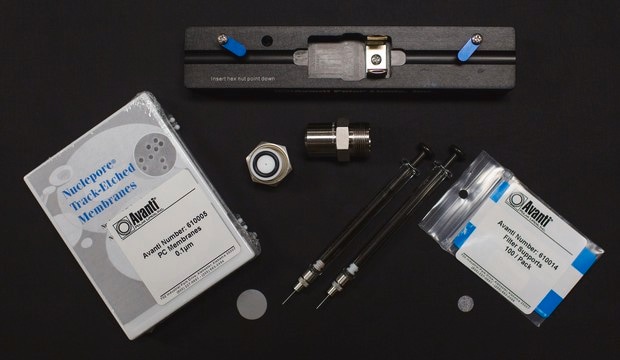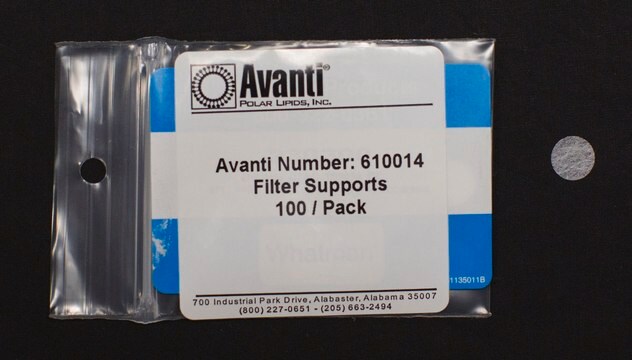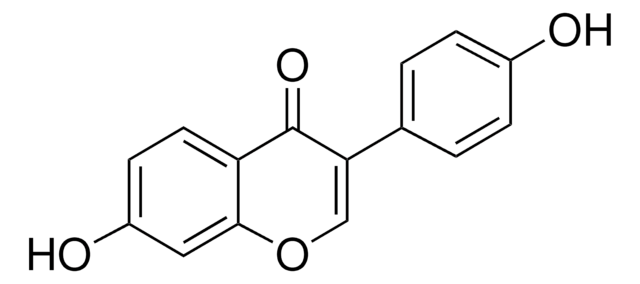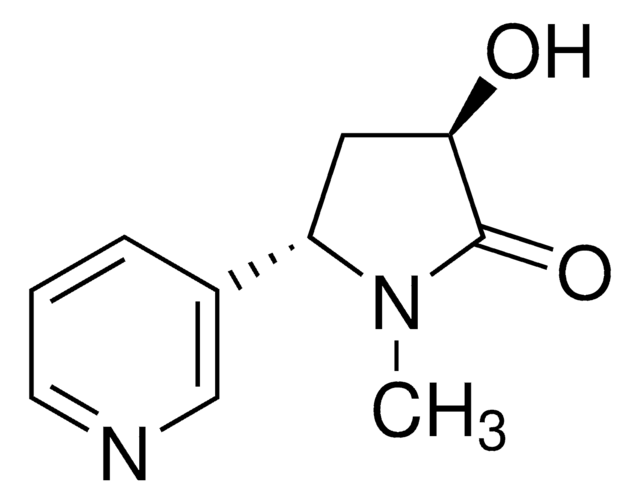Wszystkie zdjęcia(1)
Key Documents
40692
Atto 532 DOPE
suitable for fluorescence
Synonim(y):
1,2-Dioleoyl-sn-glycero-3-phosphoethanolamine labeled with Atto 532
Zaloguj sięWyświetlanie cen organizacyjnych i kontraktowych
About This Item
Kod UNSPSC:
12352108
NACRES:
NA.32
Polecane produkty
Próba
≥80.0% (HPCE)
producent / nazwa handlowa
ATTO-TEC GmbH
fluorescencja
λex 537 nm; λem 559 nm±5 nm in ethanol
przydatność
suitable for fluorescence
temp. przechowywania
−20°C
Opis ogólny
Atto 532 is a fluorescent label related to the well-known dye Rhodamine 6G. Characteristic features of the label are strong absorption, high fluorescence quantum yield, high photostability, and excellent water solubility. Thus Atto 532 is highly suitable for single-molecule detection applications and high-resolution microscopy such as PALM, dSTORM, STED etc. Additionally the dye highly qualifies to be applied in flow cytometry (FACS), fluorescence in-situ hybridization (FISH) and many more. The fluorescence is excited most efficiently in the range 515 - 545 nm.
A suitable excitation source for Atto 532 is the 532 nm output of the frequency-doubled Nd:YAG laser.
Atto-Dye Labeled Phospholipids
Sigma-Aldrich offers a variety of glycero-phospholipids carrying one or two fatty acid groups (lipophilic groups) and a phosphate ester residue (hydrophilic group). They are labeled at the hydrophilic head group. After incorporation of the phospholipid into a membrane the fluorophore is located at the water/lipid interface of the membrane. We currently provide 1,2-dipalmitoyl-sn-glycero-3-phosphoethanolamine (DPPE), 1,2-dioleoyl-sn-glycero-3-phosphoethanolamine (DOPE), palmitoyl-sn-glycero-phosphoethanolamine (PPE), and 1,2-dimyristoyl-sn-glycero-3-phospho-ethanolamine (DMPE) labeled with Atto-dyes.
find more information here
A suitable excitation source for Atto 532 is the 532 nm output of the frequency-doubled Nd:YAG laser.
Atto-Dye Labeled Phospholipids
Sigma-Aldrich offers a variety of glycero-phospholipids carrying one or two fatty acid groups (lipophilic groups) and a phosphate ester residue (hydrophilic group). They are labeled at the hydrophilic head group. After incorporation of the phospholipid into a membrane the fluorophore is located at the water/lipid interface of the membrane. We currently provide 1,2-dipalmitoyl-sn-glycero-3-phosphoethanolamine (DPPE), 1,2-dioleoyl-sn-glycero-3-phosphoethanolamine (DOPE), palmitoyl-sn-glycero-phosphoethanolamine (PPE), and 1,2-dimyristoyl-sn-glycero-3-phospho-ethanolamine (DMPE) labeled with Atto-dyes.
find more information here
Informacje prawne
This product is for Research use only. In case of intended commercialization, please contact the IP-holder (ATTO-TEC GmbH, Germany) for licensing.
This page may contain text that has been machine translated.
Kod klasy składowania
11 - Combustible Solids
Klasa zagrożenia wodnego (WGK)
WGK 3
Temperatura zapłonu (°F)
Not applicable
Temperatura zapłonu (°C)
Not applicable
Certyfikaty analizy (CoA)
Poszukaj Certyfikaty analizy (CoA), wpisując numer partii/serii produktów. Numery serii i partii można znaleźć na etykiecie produktu po słowach „seria” lub „partia”.
Masz już ten produkt?
Dokumenty związane z niedawno zakupionymi produktami zostały zamieszczone w Bibliotece dokumentów.
Breaking the diffraction barrier in fluorescence microscopy at low light intensities by using reversibly photoswitchable proteins.
Hofmann, M.; et al.
Proceedings of the National Academy of Sciences of the USA, 102(49), 17565?17569-17565?17569 (2005)
Technical Review. Types of Imaging-Direct STORM.
Jensen, E.; Crossman, D. J.
The Anatomical Record, 297(12), 2227-2231 (2014)
Stimulated emission depletion-based raster image correlation spectroscopy reveals biomolecular dynamics in live cells.
Hedde P.N.; et al.
Nature Communications, 4, 2093-2093 (2013)
Munc18-1 Tuning of Vesicle Merger and Fusion Pore Properties.
Jorgacevski, J.; et al.
The Journal of Neuroscience, 31(24), 9055-9066 (2011)
SNARE Function Is Not Involved in Early Endosome Docking.
Geumann, U.; et al.
Molecular Biology of the Cell, 19(12), 5327-5337 (2008)
Nasz zespół naukowców ma doświadczenie we wszystkich obszarach badań, w tym w naukach przyrodniczych, materiałoznawstwie, syntezie chemicznej, chromatografii, analityce i wielu innych dziedzinach.
Skontaktuj się z zespołem ds. pomocy technicznej





